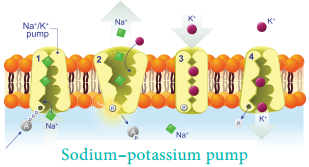Find free online Chemistry Topics covering a broad range of concepts from research institutes around the world.
Biological Importance of Sodium and Potassium
Monovalent sodium and potassium ions are found in large proportions in biological fluids. These ions perform important biological functions such as maintenance of ion balance and nerve impulse conduction. A typical 70 kg man contains about 90 g of sodium and 170 g of potassium compared with only 5 g of iron and 0.06 g of copper.
Sodium ions are found primarily on the outside of cells, being located in blood plasma and in the interstitial fluid which surrounds the cells. These ions participate in the transmission of nerve signals, in regulating the flow of water across cell membranes and in the transport of sugars and amino acids into cells.
Sodium and potassium, although so similar chemically, differ quantitatively in their ability to penetrate cell membranes, in their transport mechanisms and in their efficiency to activate enzymes.
Thus, potassium ions are the most abundant cations within cell fluids, where they activate many enzymes, participate in the oxidation of glucose to produce ATP and, with sodium, are responsible for the transmission of nerve signals. Sodium-potassium pump play an important role in transmitting nerve signals.

Sodium maintains the electrolyte balance in the body. Potassium ions are primarily found inside the cell. Potassium ions maintain the osmolarity (the concentration of a solution expressed as the total number of solute particles per litre) of the cell. They also regulate the opening and the closing of the stomata.
Sodium is found mainly in body fluids. It plays a major role in maintaining blood volume and blood pressure by attracting and holding water. Sodium is also important in cellular osmotic pressure (the passage of fluids in and out of the cells) and in transmitting nerve impulses.
Potassium is the main intracellular ion for all types of cells, while having a major role in maintenance of fluid and electrolyte balance. Potassium is necessary for the function of all living cells, and is thus present in all plant and animal tissues.
Potassium and sodium are electrolytes that help your body maintain fluid and blood volume so it can function normally. However, consuming too little potassium and too much sodium can raise your blood pressure.
Calcium and Magnesium are alkaline earth metals, which have become a necessity in our everyday lives and elements which sustain the human body and help us function properly. These two elements are extremely effective alloy mediums and are used in different industries to serve various purposes.
Function:
The body uses sodium to control blood pressure and blood volume. Your body also needs sodium for your muscles and nerves to work properly.
Along with sodium, potassium regulates the water balance and the acid-base balance in the blood and tissues, and plays a critical role in the transmission of electrical impulses in the heart. The active transport of potassium into and out of the cells is crucial to cardiovascular and nerve function.
The more potassium you eat, the more sodium you lose through urine. Potassium also helps to ease tension in your blood vessel walls, which helps further lower blood pressure. Increasing potassium through diet is recommended in adults with blood pressure above 120/80 who are otherwise healthy.
Getting enough potassium from your diet can help you maintain healthy nerve function. Summary: This mineral plays an essential role in activating nerve impulses throughout your nervous system. Nerve impulses help regulate muscle contractions, the heartbeat, reflexes and many other processes.
Potassium is necessary for the normal functioning of all cells. It regulates the heartbeat, ensures proper function of the muscles and nerves, and is vital for synthesizing protein and metabolizing carbohydrates.